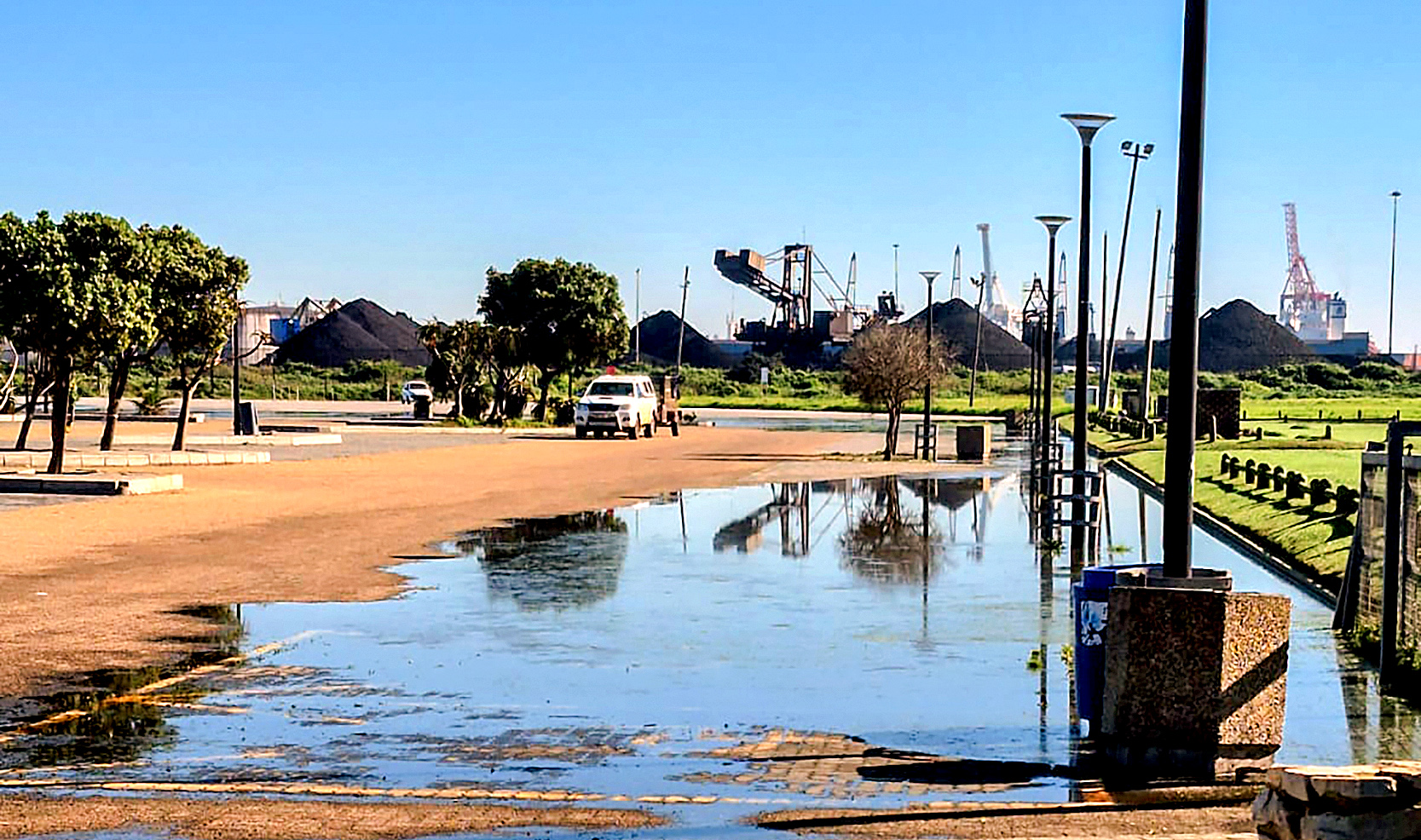With the latest repairs to a collapsed sewer line in the Gqeberha harbour, the recurring challenge of raw sewage flooding the parking area at Kings Beach and contaminating the water at the popular tourist spot has been averted – for now.
/file/dailymaverick/wp-content/uploads/MC-ShutBeach-EE.jpg)
/file/dailymaverick/wp-content/uploads/2025/07/WhatsApp-Image-2025-07-07-at-14.31.08.jpeg)
The surf at one of the metro’s longstanding Blue Flag beaches, as well as the nearby parking, dunes and natural stormwater runoff, has been clear of raw sewage for nearly two weeks.
Ailing infrastructure, pump station problems, blocked drains and collapsed pipes were just some of the recurring challenges in recent months that saw manholes near Kings Beach overflow with sludgy, foul-smelling water more than 30 times.
Read more: Recurring sewage spills, collapsing pipelines and beach closures threaten Kings Beach tourism
Since repairs to a collapsed pipeline in the adjacent harbour were completed, the beach has been reopened in time for the city to prepare properly for the coming holiday season.
Other threats
While environmentalists commended the actions taken at the key tourism venue, they also voiced their concerns over places along the coast where continued sewage spills threaten other, more environmentally significant locations.
“With summer approaching, we fully understand the importance of Kings Beach to local tourism, beachgoers and the eventing calendar. We want to reassure residents, visitors and stakeholders that every measure is being taken to protect the area’s integrity and appeal,” municipal spokesperson Sithembiso Soyaya said.
In July, two major sewage spills emanating from manholes near the Chief Dawid Stuurman International Airport flooded stormwater drains towards the coast and spilled on to the Kings Beach parking area.
Municipal contractors later determined that building equipment, similar to scaffolding, was lodged in the sewer line, blocking the pipes.
Later that month, a crumbling sewer line in the harbour blocked the flow of effluent, once again forcing contaminated water to spill on to the beach’s parking area and into the surf.
Repairs took weeks as materials and equipment had to be ordered in, and just as the issue was seemingly resolved, a second section of sewer line, a stone’s throw from the first collapse, caved in.
“Recent incidents have been the result of ageing infrastructure, heavy stormwater inflow, and occasional blockages in the coastal sewer network due to illegal dumping of foreign material by residents.
“However, we have already begun implementing targeted repairs and maintenance to mitigate the risk of future spills. These include upgrades to key pump stations, intensified monitoring of high-risk infrastructure nodes and increased maintenance intervals, particularly ahead of the summer season,” Soyaya said.
He said short-term planning included “rapid response protocols,” which included quicker cleanup of contaminated areas.
Longer-term solutions will include infrastructure renewal on coastal sewer lines and pressure management systems, specifically in places prone to spills when lines are under pressure due to increased use and heavy rain.
Ablution facilities upgrade
Ablution facilities at Kings Beach are also set for an R1m upgrade – part of mayor Babalwa Lobishe’s R10m beach improvement plans ahead of the festive season.
These plans, which include enhanced public amenities, will focus on ensuring that Gqeberha’s historic Blue Flag beaches retain their status and hopefully boost tourism and economic growth.
“We are confident that current and planned interventions will significantly reduce the likelihood of future sewage spills at Kings Beach and surrounding areas. Our teams are working proactively to ensure the area remains safe and accessible for all recreational and competitive activities,” Soyaya said.
While Soyaya did not respond to questions about the current status of Kings Beach, Ward 2 councillor Sean Tappan confirmed that the last spill was reported before repairs to the second pipe collapse commenced.
He said the beach was reopened to the public last week after water testing confirmed that contamination was under control.
Ecological risks
Now that the challenges at Kings Beach seem to be under control, environmentalist and Eastern Cape chairman of the Wildlife and Environment Society of SA Gary Koekemoer said he would like to see plans rolled out to clean up other, more environmentally significant, locations.
“While I understand Kings Beach’s significance in terms of tourism and the local economy, from a purely environmental perspective, there are far more important places that deserve urgent attention.”
He said continuous sewage spills at Brighton Beach, due to challenges at the Fish Water Flats water treatment works, had a devastating impact on sea life and the ecology of the nearby Swartkops River.
Read more: Sewage pollution, vandalism to keep Nelson Mandela Bay beach closed until summer
Further along the coast, contamination is having a major impact on perlemoen near Cape Recife and the biodiversity of the coastal region near Driftsands.
Further inland, according to Koekemoer, the Mangold and Woodlands pump stations also regularly spill sewage into the Baakens Valley, severely endangering endemic fish, birds, and other wildlife in the protected area running through the heart of Gqeberha.
“The bottom line is if we can sort out Nelson Mandela Bay’s ailing sewage infrastructure, we would solve the majority of the challenges that jeopardise the unique biodiversity of the city and its surroundings,” Koekemoer said. DM




 A collapsed sewer line near the popular Kings Beach in Summerstrand, Gqeberha, caused sewage spills in the car park and surrounds. (Photo: Supplied)
A collapsed sewer line near the popular Kings Beach in Summerstrand, Gqeberha, caused sewage spills in the car park and surrounds. (Photo: Supplied)